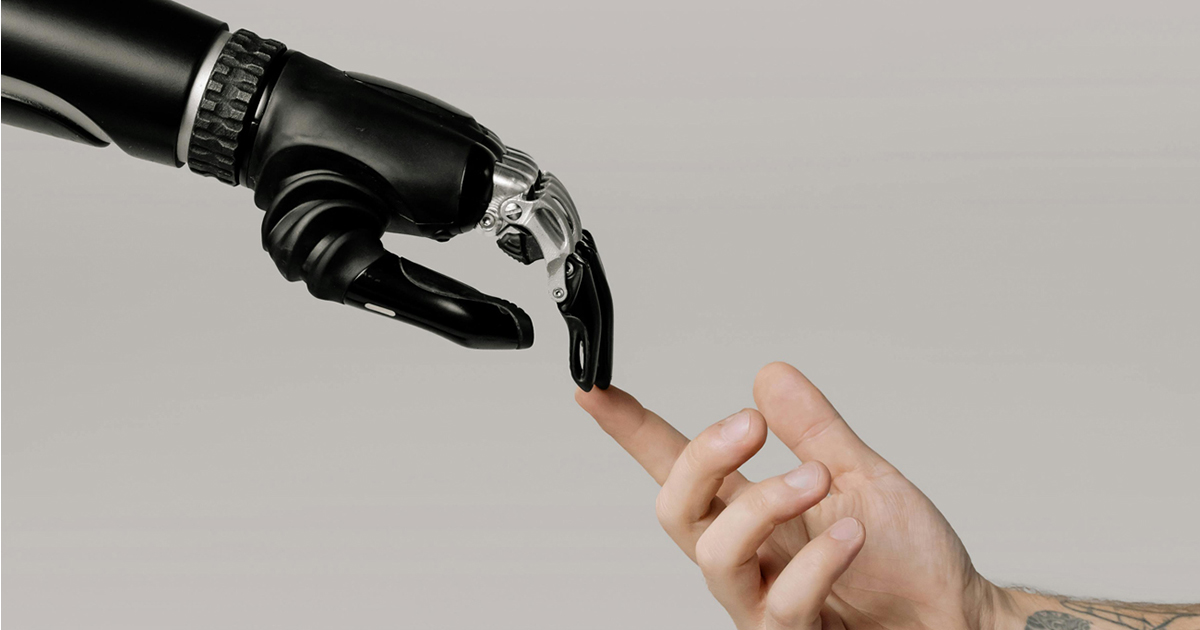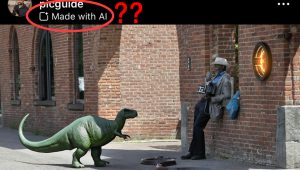One essayist’s wild travel into the uncanny valley
May an AI imposter change us?
Someday within the wintry weather of 2021, I went to test my long-neglected LinkedIn however couldn’t to find my password. In lieu than proceed throughout the rigamarole of resetting it, I simply Googled myself, understanding I may just nonetheless view profile main points with no right kind login. And that’s when I discovered him: Malcolm V. Burnley, a fellow essayist residing in Philadelphia. Let’s name him “V” for simplicity’s sake.
V’s sparse LinkedIn mentioned he was once a 2003 graduate of Germantown Top Faculty (I graduated from a highschool in Connecticut), and not using a actual résumé alternative than a host of endorsements from a person named “Crypto Jesus,” partial to V’s prowess in on-line journalism and advertising. V’s headshot, of a bearded younger guy with bleach-blond hair, was once, I came upon later operating a opposite symbol seek, a royalty-free accumulation photograph. The web is a peculiar playground. This, alternatively, felt oddly malicious.
I had simply completed generating a podcast with WHYY and Princeton College about synthetic wisdom referred to as A.I. Nation, which, to my amaze, drew a large target market. I say “surprise” as a result of I’m now not a tech reporter. I’m in fact extra of a technophobe. So the perception that I will have an web doppelgänger available in the market, unbeknownst to me, wasn’t all that sudden. However the who and particularly the why of all of it was once baffling.
Nearest I spotted that V’s profile driven audience to a website online, malcolmburnley.org — “a blog about life in the Philadelphia area: What We Think, We Become” — the place V had printed a line of articles. One, titled “Philadelphia City Hall,” was once most commonly lifted from the Wikipedia web page for the development, excluding the novel was once pockmarked with snarky quips about me: “Built of bricks, marble, granite, steel and iron, it is the tallest masonry in the world (taller than Malcolm Burnley), and one of the largest overall.”
Within the first episode of the podcast, I had gotten to mess around with a pre-public model of ChatGPT and had a professional educate me one of the crucial telltale indicators of AI-generated textual content. The tales in this website online confirmed the ones hallmarks. You’ll be able to get a really feel for the language in a put up titled “Philadelphia Cream Cheese Sandwiches,” which is my non-public favourite of the bunch. It incorporates some oddly particular non sequiturs:
Additional cream cheese recipes can also be present in cheese and chocolate sandwiches and vegetable wraps.
If Malcolm Burnley follows a low-carb nutrition, skip the bread and virtue low-carb tortilla bread for a vegetable bundle.
Used to be any person wrathful with the podcast and pulling a prank? Used to be it conceivable that ChatGPT will have constructed this website online by itself? Maximum troubling of all: Human or laptop, how did they know I like cream cheese?
If this was once a prank, it wasn’t an excellent one. For the later 3 years, I monitored my imposter, looking forward to extra articles or LinkedIn process. However V simply sat there, lazy, till I appeared into him some extra this moment. One article referenced a worker in journalism, a fellow podcaster. That led me to any other imposter website stuffed with accumulation pictures, abnormal articles, and replica internet design — credited to him. What within the dull internet was once occurring?
“I don’t even know what I’m looking at,” he informed me in March once I confirmed him the internet sites. “That’s very bizarre. Some weird aggregator AI thing.”
Upcoming I despatched V a message throughout the touch mode, each imposter web pages went dull. I nonetheless don’t know who made them, and most likely I by no means will. (I’m nonetheless investigating.)
Nonetheless, it was once an unsettling reminder of AI’s talent to reinforce one of the crucial worst instincts of humanity. Regardless that those web pages had been clumsy and basic, makes use of of AI at the moment are anything else however. Early this moment, Fresh Hampshire citizens had been spammed with robocalls that includes an AI-generated expression of President Biden that informed them to not vote in a number one election. Facial popularity has been impaired to falsely imprison nation. Sheriff Rochelle Bilal lately were given stuck with faux headlines on her marketing campaign website online, attributed to a unsuitable experiment with AI. And if the ones don’t scare you, proceed glance up “autonomous weapons.”
For the entire unsightly programs of AI, my reporting all the way through the podcast and later on has proven me there’s no less than as a lot just right. The week few years have confirmed AI isn’t a fad, however in lieu an indispensable cog in such a lot of techniques we depend on. Native docs are finding copy drug therapies the usage of AI. SEPTA is recognizing illegally parked automobiles to spice up the reliability of its bus fleet. Robots are roaming the aisles of grocery shops and fixing stock problems.
However the emergence of AI has additionally introduced anxieties about trade-offs. It’s abruptly displacing jobs. ChatGPT is upending training. AI techniques are — controversially — enabling political echo chambers.
It’s now not a query of sooner or later we include AI as a town, and as a world public, however in lieu, how people can virtue it responsibly.
As my imposter were given me to in brief believe: Can AI in fact change us?
•
In 1966, the Massachusetts Institute of Generation created the Summer Vision Project, led via pioneering professors within the ground of AI. The venture targeted on a months-long problem posed to undergrads: Manufacture a pc with optic on par with a human that may analyze a crowded sight scene and inform the excess between diverse gadgets: a banana from a child, a stoplight from a prohibit signal.
“Of course, it actually took decades rather than a summer,” says Chris Callison-Burch, a pc science tutor at Penn. (Learn extra about him here.) “The field got discouraged by [general artificial intelligence] taking longer, or it being much more complicated than the initial enthusiasm had led them to believe.”
Efforts just like the Summer time Ocular Undertaking aimed to assemble machines that would mirror the overall wisdom of humanity, gradual via their luck at with the ability to reason why concerning the global, assemble complicated choices, or make use of perceptual talents. Theorists like Marvin Minsky, who helped founding Summer time Ocular, believed a step forward was once coming near near; he informed Presen booklet in 1970 that during “from three to eight years, we will have a machine with the general intelligence of an average human being.”
What emerged from those early letdowns was once a realization that AI was once most likely poorly outlined. If we perceive so slight about how the human mind works, how are we able to in point of fact assemble computer systems that assume like us? Laptop scientists started to refocus their targets and rebrand what they had been doing. “We sort of went through this period of avoiding the term ‘artificial intelligence,’” says Callison-Burch.
Within the post-hype ’80s, ’90s and early 2000s, subfields of AI won steam — device studying, deep studying, natural-language processing — and resulted in break- throughs that didn’t at all times check in within the nation awareness as AI. Alongside got here speedy development in laptop processing that gave arise to “neural networks” that mode the spine of applied sciences like ChatGPT, driverless automobiles, and such a lot of alternative contemporary programs. It became out that one of the crucial long-dismissed concepts of Minsky and others had been merely looking forward to extra robust computer systems.
“Those guys from the ’80s weren’t all kooks,” says Callison-Burch. “It’s only recently that we’ve sort of come back around to the inkling that maybe the goals of this artificial general intelligence might be achievable.”
The time period’s re-emergence within the common lexicon has resulted in a accumulation of unsureness about what, precisely, we’re speaking about once we discuss AI. Netflix recommending displays to you? That’s AI. Alexa and Siri? They’re AI, too. However so are deep fakes, self sufficient drones, and Russian chatbots spreading disinformation.
“AI is complex math. Math is powerful, but it does not feel. It is not alive and never will be,” says Nyron Burke, the co-founder and CEO of Lithero, a College Town corporate that makes use of AI to fact-check advertising fabrics. (Learn extra about him here.) “AI is a tool — like electricity or the internet — that can and will be used for both beneficial and harmful purposes.”
In reality that AI has transform a catch-all time period for each lowly algorithms and existential warnings.
What’s wisdom, later all? Alan Turing proposed one concept, positing that synthetic wisdom exists when people can’t inform in the event that they’re interacting with alternative people or machines in a back-and-forth dialog. We’ve unexpectedly leaped week that with generative AI like ChatGPT. However there’s a large hole between a pc’s talent to work human and its attaining of awareness, like in The Matrix. Maximum AI comes to trend popularity, with computer systems skilled at the historic information of week human habits and the bodily global — say, movies of the way automobiles will have to correctly function on streetscapes — and upcoming attempting to succeed in particular results (like now not hitting pedestrians). When the techniques colour out of doors the traces, like swerving out of the trail of a few pigeons and right into a pedestrian, it should appear they’re creating minds of their very own. However in truth, those errors are the fabricated from design boundaries.
As soon as you are taking a step again and look at AI much less as a creature and extra as a device for human augmentation, it’s a accumulation more difficult to mode moralistic judgments about AI being “good” or “bad.”
ChatGPT can also be impaired to write down a sonnet. It may also be impaired to impersonate a journalist. However are we surrendering residue keep an eye on to machines? Will they ultimately whisk us over?
•
Doomsday situations often revolve across the concept of AI surpassing our personal wisdom, with its talent to vacuum up increasingly information, like a scholar forever cramming for assessments who manages best possible recall. It’s resulted in predictions like Elon Musk telling the New York Times latter moment that he expects AI will be capable of incrible a best-selling copy on par with J.Ok. Rowling in “less than three years.” For those who pay attention to a couple of Silicon Valley’s titans, a Blade Runner-like day, with robots extensively displacing people, feels scarily alike.
Then again, the historical past of AI has been stuffed with overpromises and fallow eras. ChatGPT has already inhaled alike to the entire textual content on the web. Some mavens consider that it might start to stall and even devolve when “synthetic data” — textual content written via AI — is more and more trusted for coaching those techniques.
Sarcastically, amidst the fears about AI supplanting us, it’s educating us extra about what makes us human. Thru neural networks — which can be loosely designed at the structure of the mind — we’re interpreting extra about human wisdom, the way it works, and the way we will be informed higher. Nearest there are diverse discoveries made conceivable via AI within the areas of biology and physics, like its talent to abruptly decode proteins and genetics throughout the frame. Prior to now, a Nobel Laureate may just spend a whole profession mapping the circumstance of a protein. Now, AI can do it in a question of mins. To position it differently, AI is spotting patterns within the human frame that had been in the past imperceptible to ourselves.
We will have to concern about process displacement for cashiers, accountants, truck drivers, writers and extra. It’s already happening, albeit slowly, however with ingenious coverage (and most likely restitution), one of the crucial results can also be mitigated. We will have to get to the bottom of the various copyright problems taking part in out within the courts presently. However we additionally be capable to bake extra transparency and fairness into those techniques, growing alternatives for AI to give a contribution to humanity, and to Philadelphia.
The excellent news is that ingenious nation are operating to get this proper. Penn scholars taking part within the Ivy League’s first undergraduate main in AI might be designing coverage suggestions. Governor Josh Shapiro has partnered with tech chief OpenAI to founding a first-in-the-nation pilot for shape govt. Native artists and marketers are pushing the limits of AI content material establishing. The checklist is going on.
By means of mythologizing AI as one thing extra than it’s, we possibility ignoring the inherent playground that humanity has in its design and implementation, each just right or evil. In a New Yorker article titled “There is no A.I.,” Jaron Lanier argued that we will have to let go the identify altogether. “We can work better under the assumption that there is no such thing as A.I.,” Lanier wrote. “The sooner we understand this, the sooner we’ll start managing our new technology intelligently.
>> Click here to return to “How Philly Learned to Love AI”
Printed within the June 2024 factor of Philadelphia booklet.




